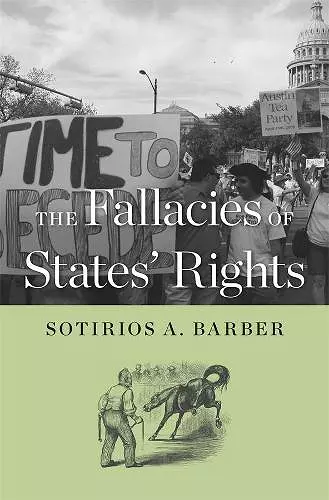The Fallacies of States' Rights
Format:Hardback
Publisher:Harvard University Press
Published:31st Jan '13
Currently unavailable, and unfortunately no date known when it will be back

States' rights arguments have been used throughout American history, from the opposition to the abolition of slavery, to the challenges to the Affordable Care Act. In a brilliant book, Barber shows that protecting states' rights neither has a constitutional foundation nor a basis in sound social policy. -- Erwin Chemerinsky, University of California, Irvine The Fallacies of States' Rights is the work of a major constitutional theorist at the top of his game. The exposition is clear, its logic razor-sharp, and its thesis powerful. Thinking with Barber as he advances his positive, ends-oriented constitutional theory, is consistently stimulating and satisfying. This is a first-rate study of American federalism. -- Ken I. Kersch, Boston College All too often, discussions of American federalism are anchored in nostalgic platitudes about a nonexistent past or simplistic models of public choice. In this rigorously argued book, Barber shows that our federalism has always been based upon a strong national government, and that current popular accounts of states' rights, if looked at closely, are incorrect and incoherent. -- Malcolm Feeley, University of California, Berkeley
Barber shows how arguments for states’ rights from John C. Calhoun to the present offend common sense, logic, and bedrock constitutional principles. The Constitution is a charter of positive benefits, not a contract among separate sovereigns whose function is to protect people from the central government, when there are greater dangers to confront.
The idea that “states’ rights” restrain national power is riding high in American judicial and popular opinion. Here, Sotirios A. Barber shows how arguments for states’ rights, from the days of John C. Calhoun to the present, have offended common sense, logic, and bedrock constitutional principles.
To begin with, states’ rights federalism cannot possibly win the debate with national federalism owing to the very forum in which the requisite argument must occur—a national one, thanks to the Civil War—and the ordinary rules of practical argumentation. Further, the political consequences of this self-defeating logic can only hasten the loss of American sovereignty to international economic forces. Both philosophical and practical reasons compel us to consider two historical alternatives to states’ rights federalism. In the federalism of John Marshall, the nation’s most renowned jurist, the national government’s duty to ensure security, prosperity, and other legitimate national ends must take precedence over all conflicting exercises of state power. In “process” federalism, the Constitution protects the states by securing their roles in national policy making and other national decisions. Barber opts for Marshall’s federalism, but the contest is close, and his analysis takes the debate into new, fertile territory.
Affirming the fundamental importance of the Preamble, Barber advocates a conception of the Constitution as a charter of positive benefits for the nation. It is not, in his view, a contract among weak separate sovereigns whose primary function is to protect people from the central government, when there are greater dangers to confront.
States' rights arguments have been used throughout American history, from the opposition to the abolition of slavery, to the challenges to the Affordable Care Act. In a brilliant book, Barber shows that protecting states' rights neither has a constitutional foundation nor a basis in sound social policy. -- Erwin Chemerinsky, University of California, Irvine
The Fallacies of States' Rights is the work of a major constitutional theorist at the top of his game. The exposition is clear, its logic razor-sharp, and its thesis powerful. Thinking with Barber as he advances his positive, ends-oriented constitutional theory, is consistently stimulating and satisfying. This is a first-rate study of American federalism. -- Ken I. Kersch, Boston College
All too often, discussions of American federalism are anchored in nostalgic platitudes about a nonexistent past or simplistic models of public choice. In this rigorously argued book, Barber shows that our federalism has always been based upon a strong national government, and that current popular accounts of states' rights, if looked at closely, are incorrect and incoherent. -- Malcolm Feeley, University of California, Berkeley
- Nominated for C. Herman Pritchett Award 2014
- Nominated for David Easton Award 2014
ISBN: 9780674066670
Dimensions: unknown
Weight: unknown
256 pages